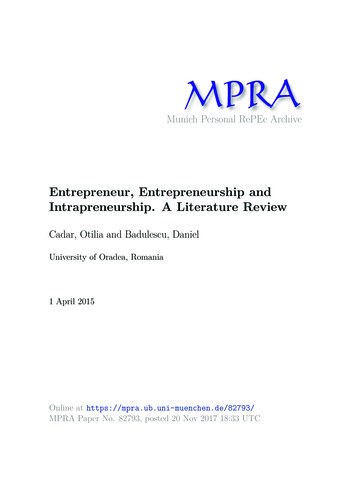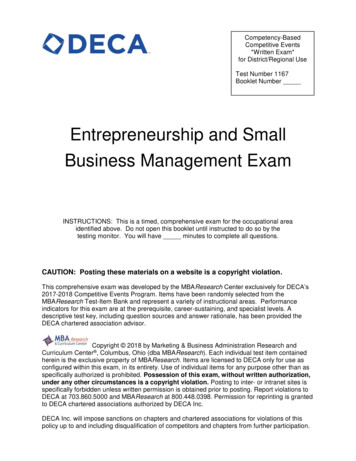
Transcription
ArticleEntrepreneurship andSubjective Well-Being: TheMediating Role ofPsychological FunctioningEntrepreneurship Theory and Practice00(0) 1–30 The Author(s) 2019Article reuse guidelines: sagepub. com/ journals- permissionsDOI: 10.1177/1042258719830314 journals. sagepub. com/ home/ etpBoris Nikolaev1, Christopher John Boudreaux1 , andMatthew Wood2AbstractWell-being is an essential outcome of engagement in entrepreneurship, but the pathway fromself-employment to well-being is poorly understood.To address this, we develop a model in whichpsychological functioning—purposeful engagement with life, realization of personal talents andcapabilities, and fulfillment of intrinsic needs such as autonomy and competence—mediates therelationship between entrepreneurship and subjective well-being. We test our model with datafrom the European Social Survey using structural equation modeling and a series of robustnesstests (e.g., propensity score matching estimators and accounting for model uncertainty). Resultssuggest that entrepreneurship is associated with substantial benefits in terms of psychologicalfunctioning—both personal and social—which almost entirely mediate the relationship betweenentrepreneurship and subjective well-being. These findings highlight psychological functioning asa critical pathway between entrepreneurship and subjective well-being.Keywordsentrepreneurship, self-employment, subjective well-being, psychological functioningEntrepreneurship is a highly dynamic and uncertain endeavor, and thus individuals who seekself-employment must confront the reality that the journey is often a roller-coaster ride (Cardon,Foo, Shepherd, & Wiklund, 2012; Cardon & Patel, 2015; Pollack, Vanepps, & Hayes, 2012).While the valleys of the ride are characterized by anticipated adversity, unforeseen challenges,and even failure (Pollack et al., 2012; Shepherd, 2003), the peaks offer enticing rewards such aspersonal autonomy, meaningful work, and financial success (e.g., Shepherd & Patzelt, 2017;Shir, Nikolaev, & Wincent, 2018). From a scholarly perspective, the culmination of traversingthese peaks and valleys is increasingly synthesized into the holistic concept of entrepreneurs’subjective well-being—the presence of positive affect, the absence of negative affect, and the1Florida Atlantic University, College of Business, Boca Raton, FL, USADepartment of Entrepreneurship, Hankamer School of Business, Waco, TX, USA2Corresponding Author:Christopher John Boudreaux, Florida Atlantic University, College of Business, 777 Glades Rd, KH 145, Boca Raton,FL 33431-0992, USA.Email: cboudreaux@ fau. edu
2Entrepreneurship Theory and Practice 00(0)experience of happiness/satisfaction—that reflects experiencing life in positive ways (Diener,1984). A growing literature on the topic has already documented that various aspects of subjective well-being can be critical drivers of opportunity evaluation, creativity, risk-taking, and efforton future-oriented entrepreneurial tasks (e.g., Baron & Tang, 2011; Dolan, Peasgood, & White,2008; Foo, 2011; Foo et al., 2009; Nikolaev, Shir, & Wiklund, 2018; Welpe, Grichnik, Michl, &Audretsch, 2012). Engaging in entrepreneurship can also lead to higher levels of job and lifesatisfaction, which are critical to well-being (e.g., Binder & Coad, 2013; GEM, 2014; Stephan &Roesler, 2010).While these findings are immensely insightful, the literature so far has mostly overlooked“eudaimonic” aspects of well-being related to psychological functioning (e.g., intrinsic psychological needs, goals, and aspirations) as a critical pathway to subjective well-being (Huppert,Marks, Vázquez, & Vitersso, 2012; Ryan & Deci, 2017; Seligman, 2012). This is salient becausestudies to date offer inconsistent empirical findings and preliminary evidence suggests that thismay be, at least in part, due to omission of key psychological variables (Baron, Franklin, &Hmieleski, 2016; Lange, 2012; Laguna, Razmus, & Żaliński, 2017; Roche, Haar, & Luthans,2014; Totterdell, Wood, & Wall, 2006). This suggests that psychological functioning could loomlarge in the relationship between entrepreneurship and well-being. In addition, questions aboutwhether well-being flows differentially to entrepreneurs who employ and supervise others orwork as solo-entrepreneurs (Prottas & Thompson, 2006; Warr, 2017), concerns about whetherwell-being is a reflection of job fit self-selection (Roche et al., 2014; Warr, 2017), and the lack ofconsideration of psychological functioning in studies on the link between entrepreneurship andwell-being further highlight potential stumbling blocks.This study seeks to address these limitations by focusing on elements of psychological functioning as critical mediators of the relationship between entrepreneurship and subjective well-being while controlling for values-based self-selection. To that end, we theorize that aspects ofpsychological functioning—purposeful engagement with life, adapting to challenging and uncertain situations, realization of personal talents and capabilities, and fulfillment of intrinsic needsof autonomy, competence, and relatedness—serve as pathways through which entrepreneursexperience subjective well-being as an aftershock of engagement in entrepreneurship (Ryff,1989; Ryan & Deci, 2000; Seligman, 2012). Hence, we introduce elements of psychologicalfunctioning as the missing link in the entrepreneurship and well-being equation.We rigorously test these conceptualizations with a sample of self-employed people whoemploy and supervise others (i.e., entrepreneur-supervisors) drawn from the European SocialSurvey (ESS). Using structural equation modeling (SEM) and a battery of robustness tests,including propensity score matching (PSM) estimators, we find that entrepreneurship is associated with substantial benefits in terms of psychological functioning—both personal and social—which almost entirely mediate the relationship between entrepreneurship and subjectivewell-being. We further explore which elements of psychological functioning are more instrumental to a different aspect of subjective well-being. Our findings highlight psychological functioning as a critical roadway from entrepreneurship to subjective well-being and further shedlight on whether the well-being benefits from entrepreneurship depend on employing and supervising others (Prottas and Thompson, 2006; Warr, 2017) and whether these benefits are merely areflection of personal values and job fit self-selection.Our study makes a rich contribution to the entrepreneurship literature and at the same timeprovides new insights for researchers in disciplines where psychological functioning may be ofinterest. In entrepreneurship, the model and findings we present add understanding by conceptualizing psychological functioning as a previously overlooked pathway in the entrepreneurshipand subjective well-being relationship, an advancement that takes a step toward reconciling theaforementioned pattern of inconsistent findings. Components of psychological functioning have
Nikolaev et al.3been documented as essential to the formation of subjective well-being (Ryan & Deci, 2017;Seligman, 2012), yet have largely been sidelined in entrepreneurship studies (see Stephan, 2018;Wiklund, Patzelt, & Dimov, 2016). This means that while some psychological elements such aspersonal autonomy, optimism, and self-efficacy have been theorized as underpinning the relationship between entrepreneurship and well-being (Baron et al., 2016; Warr & Inceoglu, 2018),they represent only a fraction of psychological functioning components. Self-acceptance, purpose and meaning, competence and engagement, and positive social relationships are also critical to the formation of subjective well-being (Ryan & Deci, 2017), but have not been considered.Hence, we provide a more complete theoretical picture of entrepreneurs’ subjective well-being.Beyond entrepreneurship, our study provides insights for the application of psychologicalfunctioning to a range of occupational phenomena that might meaningfully link to well-being.Organization behavior scholars, for instance, are keen to explore topics such as work-life balance(Beauregard & Henry, 2009; Sturges & Guest, 2004) or job and work design (Parker, 2014),which can be essential to one’s well-being (Haar, Russo, Suñe, & Ollier-Malaterre, 2014; Kinman& Jones, 2008). To the best of our knowledge, however, psychological functioning has not beenconsidered as a link between entrepreneurship, as an alternative occupational choice, andwell-being in this context. Likewise, management scholars have explored factors such as mindfulness (attention focused state of consciousness) as influential for occupational task completion(cf., Dane, 2011), yet thus far have not integrated cognitive science research linking mindfulnessto well-being (Gu, Strauss, Bond, & Cavanagh, 2015). Together, these examples illustrate howas research on the link between antecedents such as work-life balance, job design, or mindfulnesstoward task completion and well-being unfolds, researchers in varied disciplines could look atthe link between entrepreneurship and well-being through the psychological functioningapproach we advance in this paper as a blueprint.Conceptual FoundationsWe begin the development of a model of entrepreneurship, psychological functioning, and subjective well-being with a review of relevant perspectives that inform key concepts to our theorizing. Specifically, it is important to have a clear understanding of the concepts of subjectivewell-being and psychological functioning and how they link together.Subjective Well-BeingThe concept of subjective well-being involves aspects of experiencing life in positive ways,encompassing both affective states and cognitive assessments of global life judgments anddomain satisfaction (e.g., see Diener, 1984). Broadly speaking, subjective well-being is based ontwo distinct well-being accounts—hedonic and evaluative. According to the hedonic account,well-being is defined as the presence of positive affect (pleasure) and the absence of negativeaffect (pain) (Diener, 1984; Kahneman, Diener, & Schwarz, 1999). At the empirical level,hedonic well-being has been operationalized with a wide range of positive and negative feelingstates—emotions and moods such as happy, calm, sad, nervous, or fatigued—that individualsexperience in their daily lives (e.g., Barsade & Gibson, 2007; Watson, Clark, & Tellegen, 1988).The evaluative account of well-being, on the other hand, considers well-being as a cognitiveevaluation of how well one’s life is going (e.g., Diener, Emmons, Larsen, & Griffin, 1985). Thismodel assumes that people are the best judges of their own lives because they can assess theirwell-being by assigning relative weights to various hedonic experiences over time (Kahnemanet al., 1999; Kahneman & Krueger, 2006). Evaluative well-being is most commonly assessed
4Entrepreneurship Theory and Practice 00(0)with life satisfaction scales that represent a retrospective assessment of life in general or specificlife domains (Diener et al., 1985).Together, these two accounts of well-being—hedonic and evaluative—represent the conceptof subjective well-being (henceforth SWB), which captures aspects of positive affect and lifesatisfaction as well as the absence of negative affect (Diener, 1984). While it is widely acceptedthat these aspects of the human experience are intrinsically valuable, it is by now also recognizedthat SWB fails to reflect the richness of what it means to live a fully functioning life (Ryan &Deci, 2000; Seligman, 2012). This is problematic because, despite over three decades of research,the predominant approach to assess how well one’s life is going has been primarily relegated tounidimensional constructs of happiness, life satisfaction, or positive affect (e.g., see Ryff, 2014).This is also true for research in entrepreneurship, which has only recently started examiningself-employment as an essential contributor to mental health and well-being.1 Hence, a morecomprehensive theoretical framework and empirical approach are needed to capture overlookedaspects of psychological functioning that underlie SWB because of entrepreneurial engagement(Stephan & Roesler, 2010). For insight on this, we turn to a stream of research commonly calledthe “eudaimonic” approach to well-being that advances psychological functioning as a criticalcomponent of living a fulfilling life and thus a pivotal pathway to SWB (Huppert et al., 2012;Ryan & Deci, 2017; Seligman, 2012). While the eudaimonic approach has operationalized psychological functioning in various ways, we follow Huppert et al.’s integrative well-being modulein the 2012 ESS, combining elements of psychological functioning from some of the most established eudaimonic well-being accounts in the literature (Ryan & Deci, 2000; Ryff & Singer,2013; Seligman, 2012).Psychological FunctioningPsychological functioning is centered on positive life engagement where “purpose-seeking, realization of personal talents and capabilities, and enlightened self-knowledge” are central to thenotion of living well (Ryff, 2014, p. 10). More specifically, psychological functioning involvespursuing life goals (e.g., accomplishing challenging tasks, maintaining meaningful relationships,persevering in the face of adversity, or engaging in purposeful activities) that are valuable fortheir own sake in the sense that they engender realization of one’s full potential as a human being(Ryan & Deci, 2017). This is to say that psychological functioning reflects a dynamic process inwhich the satisfaction of intrinsic psychological needs, goals, and aspirations come together todrive positive feelings and satisfaction with life (Ryan & Deci, 2017; Seligman, 2012).Because psychological functioning is “both a public process and a private conduct” (Keyes,1998, p. 121), we differentiate between personal and social functioning (Diener et al., 2010; Ryff& Singer, 2013). In this respect, the literature delineates between personal and social expectations (Biddle, 1986) and further highlights how people manage incongruity between private andpublic life (Keyes, 1998; Goffman, 1959). Besides, most tasks force people to make trade-offsbetween private benefits or social generativity (e.g., Keyes, 1998; Erikson, 1963). Consequently,the personal and social sides of life are two separate sources of meaning, challenges, and engagement, which have “distinct consequences for judging a well-lived life” (Keyes, 1998, p. 121).This conceptualization is essential in the context of entrepreneurship because it shifts theemphasis from the mere state of positive or negative emotions that flow from engaging in entrepreneurial action to the enabling conditions that allow individuals to experience various aspectsof psychological functioning as part of their entrepreneurial journey—a journey that requires“facing up to the future” while bearing uncertainty, but also doing so “fueled by purpose andhope” (Dimov, 2017, p. 73; McKelvie, Haynie, & Gustavsson, 2011). In that way, entrepreneurship presents a unique context that enables individuals to define their purposes and goals and
Nikolaev et al.5Figure 1. Theoretical model.pursue them using their talents and capabilities in a self-directed way that facilitates personal andsocial functioning and therein inspire positive assessment of SWB. Our emphasis on personaland social functioning diverges from previous studies that contend entrepreneurs are people whodeploy cognitive resources such as psychological capital, optimism, and self-efficacy (e.g.,Baron et al., 2016), which, in turn, contribute to SWB. Our perspective is also novel becauseprior evidence suggests that measures of life satisfaction and affect, central to previous research,tend to be quite insensitive to engaging in challenging, self-directed and purposeful tasks (Ryan& Deci, 2017; Vittersø, 2004, 2013; Vittersø et al., 2010) that are the epicenter of the entrepreneurial journey (McMullen & Dimov, 2013) and are encompassed by elements of psychologicalfunctioning.SWB and Psychological Functioning: An Integrative FrameworkThe conceptual tenets outlined above provide the essential ingredients of the logic underpinningthe relationship between entrepreneurship and SWB, which we theorize is mediated by personaland social aspects of psychological functioning. We illustrate these relationships in Figure 1. Thevalue of this approach is that it links relevant constructs in a coherent and integrative model ofwell-being that generates explicit hypotheses about entrepreneurship as an enabling conditionfor personal and social psychological functioning. In turn, psychological functioning can beviewed as a pathway to SWB (Ryff & Singer, 1998; Ryan & Deci, 2000; Seligman, 2012). Thismoves the scholarly conversation forward by highlighting not only how entrepreneurship directlyimproves one’s psychological functioning but also shows the extent to which different aspects ofpsychological functioning mediate the relationship between entrepreneurship and SWB.As Figure 1 shows, the baseline for our model is the direct relationship between engagementin entrepreneurship and SWB. We measure entrepreneurship as self-employed people whoemploy and supervise others (i.e., entrepreneur-supervisors). We are not the first to explore thisdirect relationship and, like those who precede us (see Stephan, 2018), we too contend that there
6Entrepreneurship Theory and Practice 00(0)is a positive link between engaging in self-employment and SWB. A conceptual explanation forwhy we expect this relationship is more complicated than one might assume. This is becauseentrepreneurs face extreme working conditions—a higher level of uncertainty, job insecurity,more extended work hours, role ambiguity, and intense time-pressure (see Bradley & Roberts,2004; van Praag & Versloot, 2007; Parker, 2009). All of these elements are considered“work-stressors,” which individuals often appraise as threatening (Lazarus & Folkman, 1984).These work-related stressors, in turn, could have detrimental consequences for well-being(Häusser, Mojzisch, Niesel, & Schulz-Hardt, 2010). However, recent global analyses (e.g., GEM,2014) and systematic reviews indicate that entrepreneurs consistently report being “extremelyhappy in their work and highly satisfied with their life” and these are essential elements ofwell-being (Stephan & Roesler, 2010; Stephan, 2018). A possible explanation, then, is that entrepreneurs perceive work-related stressors as less straining (Häusser et al., 2010) because they donot follow a set of rules and procedures prescribed by others (Baron & Shane, 2007). At the sametime, entrepreneurs are more likely to find their work challenging and enjoyable (Benz & Frey,2008) and they gain satisfaction from vast opportunities for personal learning and growth,another key contributor to feelings of well-being.These insights fit with the notion that SWB involves aspects of both experiencing life in positive ways and not experiencing life in negative ways (Diener, 1984). Research to date indicatesthat entrepreneurship is a stimulating environment that provides “the challenge of learning”(Cardon & Patel, 2015). This is precisely the type of environment that is likely to stimulatehigher levels of job and life satisfaction that coalesce into a heightened sense of SWB (Scitovsky,1976, p. 91). Hence, we contend that since people spend considerable time at work, entrepreneur-supervisors will experience higher levels of SWB compared to traditional salariedworkers.While this approach is in line with extant research and reflects our conceptual reasoning forexpecting a positive relationship between entrepreneurship and SWB, it diverges from a fewrecent studies that offer a different explanation. Namely, recent research suggests that the relationship between entrepreneurship and well-being is driven by values-based self-selection (e.g.,Warr, 2017; Warr & Inceoglu, 2018) where the type of individuals who become entrepreneurs arethose who value job attributes such as autonomy, challenge, stimulation, and uncertainty thatcharacterize the entrepreneurial journey (McMullen & Dimov, 2013). Thus, it is not necessarilythat entrepreneurship enables individuals to experience higher levels of SWB, but rather it is thetype of individuals who pursue entrepreneurship that is more likely to experience higher job fitbecause their personal values are aligned with the job characteristics of this career path. Ourreasoning above, however, leads us to contend that entrepreneurship provides well-being benefits independent of one’s personal values that drive self-selection to achieve job fit.Further, while research indicates that only entrepreneurs who do not employ and superviseothers accrue well-being benefits from entrepreneurship (Warr, 2017), we argue that entrepreneur-supervisors are also able to experience the well-being benefits from entrepreneurship.Based on recent research documenting that self-employed people who manage others (i.e., havesubordinates) generate significantly higher incomes, and, more generally, have higher growthexpectations compared to sole proprietors (Parker, 2009; GEM, 2016), we hypothesize thatentrepreneur-supervisors accrue even more significant benefits from well-being than salariedemployees and entrepreneurs who do not supervise others. Future growth aspirations can beparticularly impactful for entrepreneurs’ sense of achievement, self-acceptance, autonomy,engagement, meaning, and purpose (Wiklund, Davidsson, & Delmar, 2003), all of which contribute to well-being and are central to psychological functioning. In addition, prior researchindicates that entrepreneurs who employ others (compared to solo entrepreneurs) are more likelyto perceive that they have lower workloads, more time to spend on favored tasks, and greater
Nikolaev et al.7control over their company (Wiklund et al., 2003). Based on these insights, we hypothesize thatit is precisely those entrepreneurs who employ others (i.e., have at least one employee) and reportbeing responsible for supervising those employees that are more likely to experience greaterwell-being benefits. We call this class of individuals “entrepreneur-supervisor” and assert thatthese individuals, on average, will experience higher levels of SWB as outlined in the followinghypothesis:Hypothesis 1: Entrepreneur-supervisors experience higher levels of subjective well-being thanthose who engage in wage employment.Psychological Functioning as a Pathway to SWBWhile we have argued that entrepreneurship can lead to higher levels of SWB, independent ofvalues-based self-selection, what is truly novel about our approach is the notion that this effect ismediated mainly by psychological functioning. Further, we break down psychological functioning into its personal and social elements, which provides a more nuanced picture of how positivelife engagement such as pursuing purposeful activities and challenging tasks can stimulate SWB.Below, we first focus on the role of personal functioning and then move to social functioning.Personal functioning. Personal functioning is a multifaceted concept that is comprised of people’sresilience, meaning and purpose, autonomy and control, engagement, competence, and self-acceptance (Diener et al., 2010; Ryan & Deci, 2000; Seligman, 2012). Resilience is often associated with adaptive functioning under challenging circumstances (Ryff & Singer, 1998). In thatsense, resilience reflects doing well (positive functioning) after exposure to severe stress and canbe particularly relevant in the context of entrepreneurship, which is challenging and uncertain interms of achieving positive outcomes (Shepherd, 2003; Shepherd, 2009). Starting and growing abusiness is fraught with difficulty and thus adversity is a common experience (Gimeno, Folta,Cooper, & Woo, 1997). This can lead to higher levels of stress (Cardon & Patel, 2015), which,can negatively impact mental health and well-being. However, confronting this reality buildsresilience as individuals learn to persist in the face of adversity (Häusser et al., 2010). Priorresearch, for example, indicates that entrepreneurs are more likely to develop various copingstrategies that allow them to perceive stressors as less straining (Rindova, Barry, & Ketchen,2009; Stephan, 2018), which, in turn, can help them adapt to stressful situations and henceincrease their resilience.This dynamic is critical when viewed through the lens of personal functioning because ithighlights the importance of meaning and purpose. That is, engaging in entrepreneurship canenhance the extent to which people believe that their current actions will lead to positive statesin the future (Wood, McKelvie, & Haynie, 2014). Intentional pursuit of future-oriented goalsimproves personal functioning (Ryff, 2014). Because entrepreneurs do not have to follow organizational rules, procedures, and goals set by others (Baron & Shane, 2007), they are more likelyto pursue activities and objectives they find personally meaningful and fulfilling (McMullen &Dimov, 2013; Shir et al., 2018). The focus on purposeful future-oriented activities, in turn, canenhance job satisfaction and further contribute to higher levels of SWB (Parker, 2014).Entrepreneurs are also seen as having a high degree of autonomy and control that is just ascritical for their beliefs and actions (Benz & Frey, 2008; Lange, 2012). Autonomy and control—living in accord with one’s personal convictions and making choices independent of others(Metaal, 1992)—are considered basic psychological human needs (Baumeister & Leary, 1995;deCharms, 1981; Ryan & Deci, 2000). As a self-directed pursuit, entrepreneurship facilitates
8Entrepreneurship Theory and Practice 00(0)autonomy and control because it allows one to set the rules and determine their own course ofaction (Benz & Frey, 2004; van Gelderen & Jansen, 2006). In that way, autonomy is a source ofsatisfaction manifested in entrepreneurship where one can make independent choices over thetype and content of their work, have the freedom to organize and schedule different tasks, pursuemore meaningful and goal-oriented activities, and have flexibility how to respond to various lifestressors (Stephan, 2018).While the opportunity to realize autonomy is an important benefit that flows from entrepreneurship, other personal functioning dimensions such as engagement also emerge during theentrepreneurial process. Starting and running a business, especially one that employs others,involves engagement in a wide range of complex activities, some of which individuals will havelimited expertise. As Lazear, 2004, p. 208) points out, “entrepreneurs must be jacks-of-all-trades”and thus entrepreneurship provides opportunities for engagement that often surfaces as dynamiclearning and continuous development of new skills (Cope, 2005; Corbett, 2005). Such personaldevelopment, then, is a benefit that can flow from navigating the complexities of self-employment (Lerner, Hunt, & Dimov, 2018) and ties closely with the personal functioning dimension ofcompetence.Competence—the ability to make effective decisions and perform well—is essential to humanfunctioning as it focuses on how individuals use their personal strengths and abilities to takeadvantage of different opportunities in their lives (Harter, 1978; Ryan & Deci, 2000; White,1963). Because entrepreneurs have no supervisors to answer to, they can choose to engage “inmeaningful activities that develop their skills” (Stephan & Roesler, 2010, p. 8). Having a senseof competence can also flow from entrepreneurship because it provides an environment wherethe ability to persuade, lead and direct others in ways that lead to financial or material accomplishment is recognized and rewarded (Holland, 1997; Schmitt-Rodermund, 2004). That is,entrepreneurship allows individuals to develop an “entrepreneurial competence” toward selecting promising business opportunities and devising and executing strategies for leveraging them(Chandler & Hanks, 1994). Such competence is often developed experientially through learningby doing, as fulfilling the “changing role of the entrepreneur through the different phases ofdevelopment of a business supports the development of competence” (Mitchelmore & Rowley,2010, p. 93).Like engagement and competence, self-acceptance is an important aspect of the personalfunctioning equation. Self-acceptance is the knowledge and acceptance individuals have ofthemselves, including awareness of their personal limitations (Ryff & Singer, 1998). Since entrepreneurs have the freedom to engage in meaningful activities that allow them to develop theirown competences (Shir et al., 2018), they are more likely to be aware of their own limitationsand capabilities (Ryan & Deci, 2017). Another avenue for self-acceptance in entrepreneurship isthe opportunities individuals pursue through venture creation often involve taking the perspective of others which requires enough self-acceptance to put yourself in the shoes of others(McMullen, 2015). As the venture grows and develops, self-acceptance may take a differentform, especially as the venture runs up against the personal limitations of the founder. Theselimitations can be structural (e.g., not enough time to do it all) (Verheul, Thurik, Grilo, & van derZwan, 2012), skills-based (e.g., differences between being an entrepreneur and a manager)(Busenitz & Barney, 1997), or cognitive (e.g., ADHD) (Wiklund et al., 2016). Regardless of thelimitation, confronting the problems that flow from them asks entrepreneurs to surrender to theirown shortcomings. This level of self-acceptance is typically not asked of wage employees, andthus entrepreneurship becomes a context where self-acceptance is more likely to be realized.Taken together, the arguments above highlight resilience,
Entrepreneurship and Subjective Well-Being: The Mediating Role of Psychological Functioning Boris Nikolaev1, Christopher John Boudreaux1 na, d Matthew Wood2 Abstract Well-being is an essential outcom










